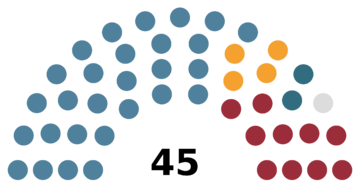Politics of Mava
 |
|---|
| This article is part of a series on the politics and government of Mava |
|
Mava (officially the Republic of Mava) is a unitary parliamentary republic, in which the president is head of state and the prime minister is head of government. Executive power is exercised by the Government of the Republic of Mava, headed by the prime minister. Legislative power is exercised by the Assembly, to which the government reports. The Assembly consists of 45 members and are elected every two years. The judicial system consists of a hierarchy of courts, with the Supreme Court at its apex.
The Constitution of the Republic of Mava is the highest legal document, setting out political rights, the system of government, and the functions of the judiciary. The current constitution, which replaced the Constitution of 1929, went into effect on 1 June 1978 after being approved in a referendum the previous year.
Mava is a dominant-party system in which the Progressive Party of the Mavean Islands predominates, having won every election since independence. The Political Congress of the Mavean Labour Movement (alternatively known as the Mavean Labour Congress) is the main alternative party and is the principal opposition party in the Assembly. Other minor parties have achieved limited parliamentary representation, but have very minimal influence. The Mavean political system is classified as "hybrid", with the Progressive Party's criticised for undue influence over the civil service, police, and elections administration.
Executive branch
| Office | Name | Party | Since |
|---|---|---|---|
| President | Kausánek Maláti | Progressive Party of the Mavean Islands | 1 July 2021 |
| Prime Minister | Nua Kiuiáké | Progressive Party of the Mavean Islands | 23 May 2022 |
The president of Mava is the head of state and nominal head of government, explicitly designated as chief executive in the Mavean constitution. The president is elected by the Assembly every five years, with a two-thirds majority necessary. Every president since independence has belonged to the Progressive Party. The incumbent President, Kausánek Maláti, was elected on 7 June 2021 and assumed office on 1 July that year. Although the president is de jure chief executive, political powers are usually discharged in the president's name by the prime minister as head of the democratically-elected government. However, because of Progressive Party's predominant position, the matter of whether the president or prime minister wields greater power is determined by which officeholder is party leader.
The leader of the majority party or majority coalition is usually appointed prime minister by the president, following a confirmatory vote in the Assembly. This vote is generally held on the penultimate Monday of May, giving time for newly-elected Members of the Assembly to travel to Pa'a. Following Assembly elections on 12 May 2022, the Progressive Party formed the 50th Government of Mava, with Nua Kiuiáké appointed prime minister on 23 May following a confirmatory vote by the Assembly.
Legislature
Legislative power is vested in the Assembly of the Republic of Mava, which is the parliament of Mava. The constitution also vests limited legislative powers in the government, although this is largely limited to areas granted to it by laws passed by the Assembly rather than being independent of the legislative oversight. The Assembly is where all laws are to be proposed and debated, and its approval is necessary for laws to be presented to the president for promulgation. The government is appointed from amongst the members of the legislative branch, and it is the duty of the Assembly to hold the government to account. The Assembly is responsible for approving the formation of a government and may also remove a government through a constructive motion of no confidence.
Voters elect 45 members in single-member constituencies by universal sufferage according to the first-past-the-post electoral system. Elections are held every two years, although the president may dissolve the Assembly earlier and call for new elections. The Assembly is unicameral. Until 1994, it was organised as a de facto bicameral body, with a "Grand Committee of the Assembly" responsible for a final review of all laws passed by the wider assembly and for presenting it to the president. The Grand Committee was appointed by the Speaker of the Assembly along technocratic lines, with members selected for their knowledge and experience. Reforms in 1994 abolished the Grand Committee and ensured the equality of all members.
Political parties in legislative elections
See also
- Politics of Mava
- Culture of Mava
Notes
External links
- Mava. The Global Factbook. United Nations
